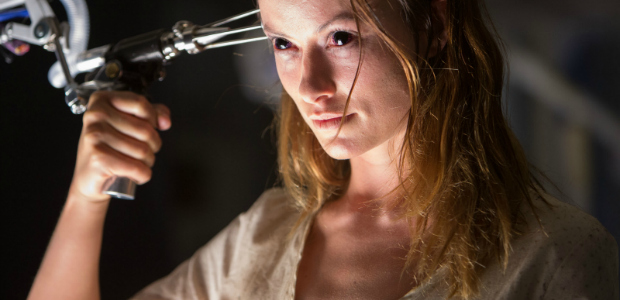I get pretty angry when I watch a horror movie the relies heavily on jump scares to freak out audiences, especially when that ends up being the only tool in its box. Without any other means of forcing viewers to the edge of their seats, you start to naturally relax when, all of a sudden, some guy in a pig mask jumps out at you. And it’s normally not even the guy in the pig mask that causes this jolt. It’s the loud blast of sound that accompanies him. Take that away, and you’ve got nothing.
There are a handful of these moments in The Lazarus Effect, and they all made me increasingly more frustrated. Without them, you get what I imagine a freakier X-Men: The Last Stand would look like.
If you’ve seen the trailers for The Lazarus Effect, you’re probably expecting to see a group of scientists who’ve figured out how to bring Olivia Wilde back from the dead, but they inadvertently bring something else back with her. Well, that’s, like, half right.
Frank (Mark Duplass) and Zoe (Wilde) are the leaders of the Lazarus team that consists of Clay (Evan Peters) and Niko (Donald Glover). Together, they’ve created what they call a Lazarus serum, which is designed to prolong the life of someone on the brink of death… or resurrect someone to give doctors more time to save them. Though they’ve only been experimenting on animals, they’re confident in their product’s success, so they’ve enlisted a student named Eva (Sarah Bolger) to come in and record the entire process on film.
Lazarus is clearly a reference to the Lazarus from the Bible. In case you didn’t figure this out, there are so many amateurly placed religious references sprinkled throughout to lead you to this conclusion. There’s even a moment when Evan Peters just shouts, “Bible!” (I’m not joking.)
Essentially, these guys are playing Jesus, and we all know what happens when people try to be Jesus. After they’ve had success in resurrecting a dead dog (God spelled backwards, y’all!), Zoe starts to have some reservations about what they’re doing. As she massages the crucifix dangling from her neck, she starts to wonder whether the dog even wanted to come back or if they “ripped him out of Heaven.” There’s something clearly wrong with the dog. It won’t eat, it doesn’t really like to play, it’s prone to lashing out randomly and aggressively, and it likes to stare at Zoe while she sleeps. But these questions don’t haunt her too much. She’s not that religious, after all, because then there might not be a movie. This religion-vs-science debate the film seems to be setting up is quickly dropped, like many plot points in this film.
Eventually, there’s a freak accident, and Zoe dies (this is in the trailer, so no quite a spoiler). Consumed with grief, Frank injects her with the Lazarus serum. Like the dog, she’s brought back to life. But here’s where it turns into the horrifically deformed love child of one of the worst X-Men movies and Lucy. Zoe starts exhibiting telekinetic and telepathic abilities. Your average person would think she’s possessed, especially after one scene where she breaks a mirror with her mind and sees two faces staring back at her in the shards — Zoe, and a more sinister Zoe. Given this moment and the dog’s previous actions, it’s assumed that the some demonic entity has come back with them.
Right? Wrong!
This is director David Gelb’s first time helming a feature film, and it’s Luke Dawson and Jeremy Slater’s first feature film screenwriting credit. Despite their newbie statuses, there is no excuse for the way The Lazarus Effect turned out. There is nothing original or imaginative going on here. At best, the story is a poorly spliced together version of a variety of other movies. The problem here is that these guys didn’t seem to know exactly what they wanted to say or accomplish. In placing Frank against Zoe and the administration of the college at which he’s stationed, they should have gone down the science-vs-religion path. Frank always chooses science and facts over religion, while Zoe is a Catholic girl at heart (or, more accurately, she’s Catholic when it’s convenient to move the story forward), and the administration is worried about what religious leaders and fanatics will say about the work he’s conducting. There’s a moment when Zoe takes off her crucifix and places it in a petri dish, clearly showing that the nods to this theme are there. But much like how Frank instantly disregarded all rhyme and reason in his desperation to bring Zoe back to life, the story decided to ignore the groundwork put in place.
As for the scares, they are cheap. And worse still, there’s nothing else that would make this film “scary.” There’s not even that much gore, and when it does appear, it’s dripping out of something, forcing you to only imagine what kind of horrors were inflicted off camera. This marks a major low for Blumhouse Productions. It made a name for itself as the modern giant of horror films, producing such truly frightening titles as Insidious, Sinister and The Purge. Their model of “low budgets / big results” has worked in the past because the people attached to actually make these films had clear direction and execution plans. While these elements weren’t there for The Lazarus Effect, a little more money could’ve actually gone a long way. For instance, how about sprucing up the one room you filmed the majority of the movie, guys?
I’m placing all of the blame on the script and filmmaking, but that’s because the actors can only do so much with what they’re given. Duplass and Wilde, though not wholly suited for the horror genre, can’t shit out golden eggs for the box office if you feed them muck. If you have to include a fast and nasty blast of sound to freak people out when literally nothing else is going on, that’s a deal breaker! If you can see the twists (if you could even call them that) coming from a mile away, that’s a deal breaker! If you can predict the general outcome of the movie from the start, that’s a deal breaker! If at times your movie looks like X-Men 3, sounds like X-Men 3 but is just as bad as X-Men 3, that’s a deal breaker!











